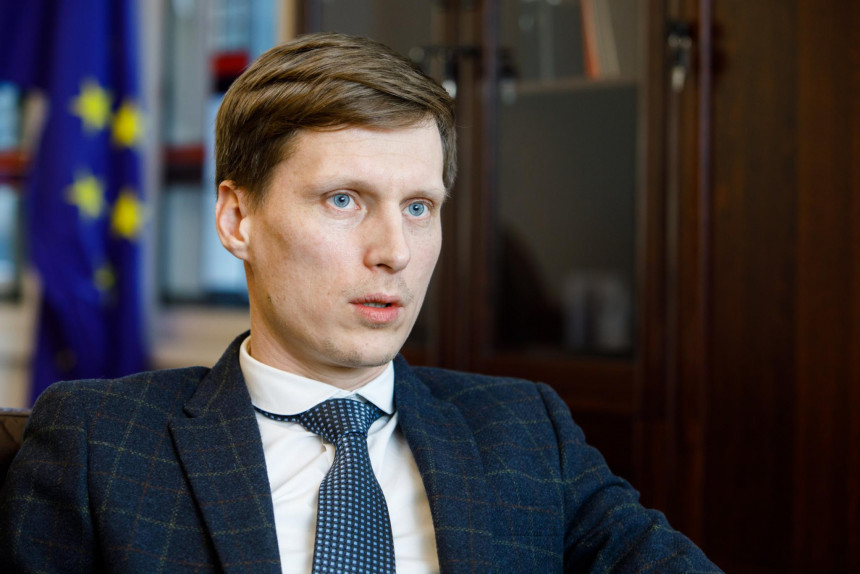MP Ralfs Nemiro: In the first wave of Covid, complete lockdown should have been initiated

Although Prime Minister Krišjānis Kariņš has called on the factions of the Saeima faction representing the coalition to retain government-like rhetoric, deputies do not always follow this call. This is even more difficult to do if the issue is about Covid and the restrictions it imposes since on this issue many in the legislature have an opinion that is incompatible with government decisions.
Asked after the weekly meeting of the Cooperation Council whether he thought the government's communication had been good and clear lately, the prime minister said the government was made up of five political forces and it was difficult to ensure that "every minister from his party speaks the same on all issues".
According to him, often the parties, ministers and deputies of the Saeima on certain issues "dare to express their opinion, which is not consistent with what has been decided jointly". "Often they support the issue in voting, but outside of voting say something completely different," says K. Kariņš, adding that with such preconditions it is challenging to have unified communication because the main speakers are government ministers and coalition members in parliament. Therefore, it would be very good if the message from the deputies of the Saeima would not differ because, in the opinion of the Prime Minister, where everyone speaks similarly, there is more clarity.
One of the speakers of such an incongruent message is Ralfs Nemiro, a member of the KPV LV Saeima faction in the coalition, former Minister of Economics, who now heads the Saeima Economic, Agricultural, Environmental and Regional Policy Committee. He calls the government's work in combating the pandemic chaotic and believes that the provision of services and trade should be restricted with just one condition - gathering restrictions, that are set for each sector. He also does not rule out the usefulness of setting a complete lockdown.
Which restrictions should be relaxed and what gathering restrictions would you propose?
Already when the first wave of Covid was starting, the Cabinet of Ministers meeting defined one basic principle that could reduce the spread - reducing gatherings, observing the distance of two meters. I am categorically opposed to developing any restrictions on specific product groups, fields. It is unacceptable to consider bans on goods, shops that can and cannot work, professions, businesses and so on.
We must return to what the government initially said by limiting the gatherings. Honestly, we see that the ban on working for, for example, manicure and pedicure providers has not worked. They were in the gray area. Also for hardware stores, where people would just shop using a legal entity, and these restrictions do not work. It should be noted that the shops follow the restrictions set by the government very strictly, therefore there are no obstacles to complying with the gathering restrictions.
Which government decisions do you find chaotic in particular?
Regarding procedure, a chaotic decision looks like this - the government adopts restrictions, then in the next sitting they are relaxed, then strengthened, then relaxed again. Even I, as a Member of the Saeima, who has to decide on the approval of restrictions at the Saeima sitting, cannot keep track of what the government decides. In addition, it often does not decide at one meeting but postpones the decision to the next. For example, for those small regional shops. Those decisions have been chaotic. There have been mistakes, but we can correct them by returning to the principle of reducing gathering.
There are also some voices in coalition parties that say the only sure way to stop a pandemic is a complete lockdown. You agree with this view, why?
This decision had to be made during the first wave of Covid. Okay, the first wave was the moment when the pandemic was something completely new and many decisions were hasty and not thought through. There was already enough experience in the second wave, so we should have made these decisions. If we set complete lockdown, say, for a month, and the people would not gather at all, then a month would seem like a very good time frame to limit the spread of the virus. But it's already too late, we're in the dark red zone. However, if such a decision is made, then - boldly, with one decision and for a month. Then, if the numbers do not fall dramatically, we have to start thinking about what should and should not be allowed to society, and that is the government's framework.
| ***** Be the first to read interesting news from Latvia and the world by joining our Telegram and Signal channels. |